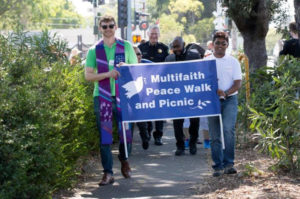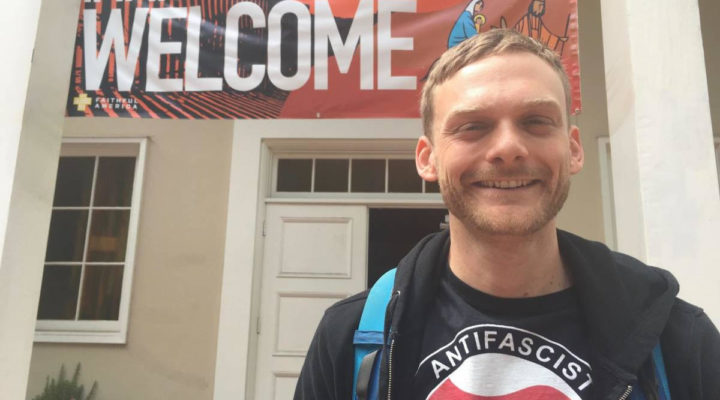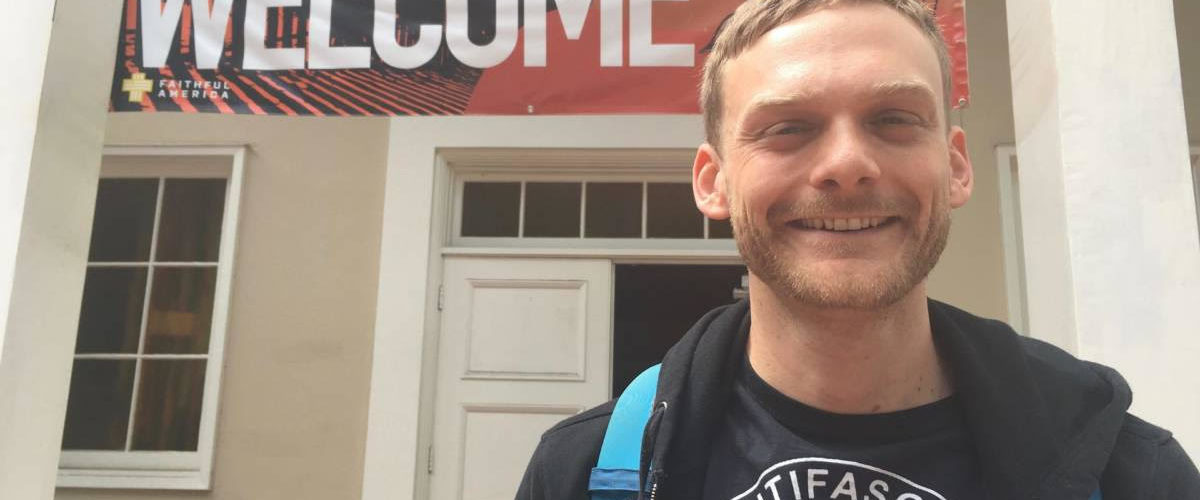Gregory Stevens isn’t your run-of-the-mill Baptist minister.
“A quick note,” he said in a recent email to Baptist News Global. “I prefer to use ‘Gxd’ or ‘Gxddess’ when writing God to represent trans, feminist, queer, and gender-bending struggles.”

Gregory Stevens during a march for peace. (Photo/Courtesy of Gregory Stevens)
He also isn’t, for the moment, an employed Baptist minister, either. Stevens’ resigned May 15 as associate pastor at First Baptist Church in Palo Alto, California.
Leading to the move were tweets Stevens had posted months before, including one slamming ultra-rich Palo Alto as “an elitist s— den of hate,” were introduced during a city council meeting the night before. The congregation was seeking a permit needed to rent space to other organizations.
News of the Florida native’s tweets have gone viral.
Stevens, who is gay, agreed to answer questions via email about the experience and about his Baptist faith. His comments have been edited for clarity.
Where in Florida are you from, and what kinds of churches did you attend growing up?
I am from Tampa. I first started going to church in middle school at the First Baptist Church of Lutz, a Southern Baptist church. I went with a neighbor, not my family. I then moved on to Grace Family Church, a non-denominational megachurch. I was an intern. I left the internship for theological reasons and took my first youth ministry position at Bay Hope Church (back then it was called Van Dyke United Methodist Church). I again left for theological reasons and moved to the more progressive Missio Dei Community (an emergent church) and worked on the staff as an associate minister. And then I moved to California for seminary at the Claremont School of Theology.
Why remain Baptist when there are other faith groups more friendly to LGBTQ people?
When I moved to California for seminary I came out queer in the first semester at Claremont. I was looking at the UCC (United Church of Christ) and DOC (Disciples of Christ) as my future church homes, having heard they were more open to queer leaders. I chose the DOC because they supported young broke aspiring ministers like myself, and also affirmed my sexuality – or so I thought. When I graduated, and it was time to find a job there were no DOC churches in the area that were willing to hire a young queer graduate.
Growing up a Southern Baptist and then connecting with a few progressive American Baptists at Claremont, I was excited to hear of a Bay Area church seeking a younger leader whose queer identity was honored and not dismissed as sinful. I was able to reconnect to my Baptist roots. I also dove head first into researching more about the Baptist tradition and found myself in a tradition rooted in radical Christianity (Anabaptists) that later emerged in the United States among black and working-class peoples (American Baptists). From Nat Turner to Martin Luther King, I find our tradition to be among, for, and with the oppressed.
Why did you want to serve a church in California?
I absolutely wanted to stay in California – and still do. As an East Coast, Florida boy, I left as a refugee and found CA to be a breath of fresh air.
What is your calling to ministry, and your ministry goals going forward?
I feel called by the Gxdess to speak Truth to power, to transform injustice, to fight apathy, and to create the Queerdom of Gxd here on Earth. Spirit calls me to proclaim Gospel with and for impoverished people, to proclaim abolition of prisons, restore sight to those blinded by dominant culture, and to set the oppressed free. In moving forward, I hope to put flesh on this radical calling here in the San Francisco Bay Area.
Was it ever ironic to you that there is a Baptist church in Palo Alto?
Because of what Palo Alto has become, an elitist enclave of wealth and power, it is ironic to be a Christian here (not only a Baptist). Reading scripture in this town is dangerous: the first will be last, camels can get through the eye of a needle well before rich people can get into heaven, and the impoverished, weak, and marginalized are blessed with Gxd’s favor.
Have the “s— den” and other tweets been accurately reported?
It is easy to take tweets out of context. All meaning collapses when someone takes a screen shot of one tweet, gives zero context, and is not in any sort of relationship with me or my social media accounts. When I referred to the city as an “elitist s— den,” it was in the context of criticism about our ruthless capitalist economy, how our society is hierarchically structured, and how Palo Alto justifies exploitation, alienation, and the centralization of wealth into the hands of very few in the name of Liberalism. I have been pleased with some of the ways The Guardian and Atlantic articles have shared my story, taking the social justice purpose of my comments without letting a few curse words overshadow the content of the message.
What brought you to a place where you felt it necessary to make those comments?
After 2.5 years of ministry and minimal progress in every community, church, and citywide project I was a part of – my anger toward the injustices propped up by elitist liberalism grew into critical tweets. The anger that comes from working with those suffering from living on the streets, and the disappointment with millionaires and billionaires who profess progressive politics but hoard wealth and reproduce the economic system that impoverishes, exploits, and alienates my houseless friends created a fire in my belly that was expressed in short, pithy tweets.
Have you encountered people surprised that a Baptist minister would make those comments, or that there are progressive Baptists out there?
Just about everyone I meet is surprised by my radical Christian witness and my love of the Baptist tradition. Our denomination and our religious tradition have been hi-jacked by the capitalist class. I find great joy in reclaiming our traditions from those who have distorted the message and ignored the clear biblical call toward justice.
What do you make of what you have experienced recently?
I have learned how the elite and capitalist class work: they seek to alienate anyone who differs from their oppressive dominant culture. If you challenge their ways, if you ask why people are poor rather than simply help the poor, you will be viciously attacked. I have learned that I need to be on the defensive, protecting myself, my friends, and my ministry partners from these hateful attacks through stronger cyber security tactics and stronger relations of mutual aid among comrades in the struggle. My offensive strategies of resistance must also be refined, my tongue sharpened, and my witness nuanced for greater effectiveness in decolonializing both Christianity and dominant culture.
I am thankful for this experience as it has sped up my learning around faith-filled activism and how to better challenge the powerful with Biblical truths.


